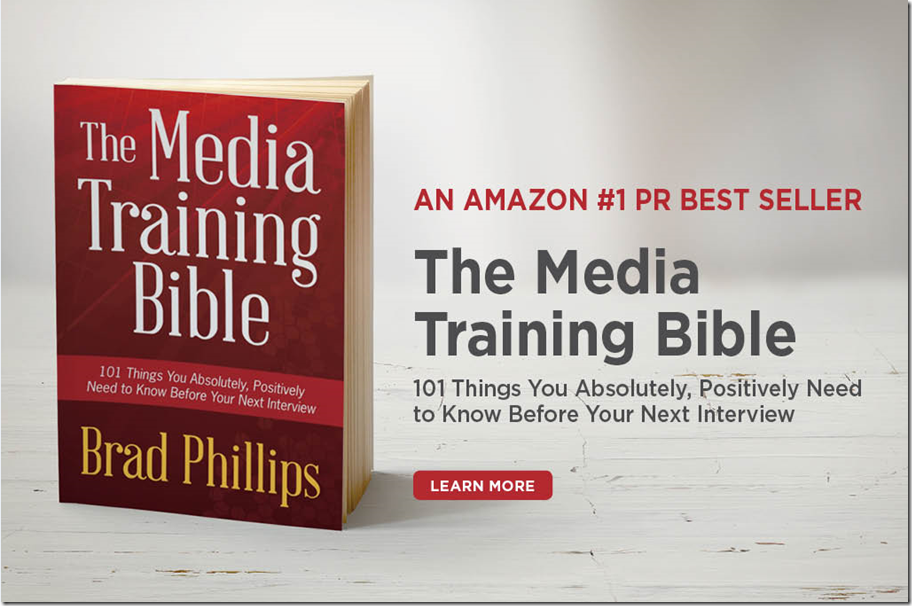Is It Time For Media Trainers To Start Sweating?
I recently came across a new book called Leadership In Focus: Bringing Out Your Best On Camera by filmmaker Vern Oakley.
His book was publicized in Corporate Responsibility Magazine, and the title of that piece—“Time For Media Trainers To Start Sweating”—caught my attention. After reading the article and preview of his book on Amazon, it became clear that Mr. Oakley has strong views about media trainers—and they’re not even remotely positive.
Here’s what he writes in a section called “Beware of Media Training” about corporate CEOs, presidents, and leaders who are faced with the stress of a camera’s lens being focused onto them:
“They fall back on one trusty tool—media training. But that’s the exact wrong response, because while media training prepares you for specific situations, it can suck all the authenticity out of you and leave nothing but a corporate talking head. It teaches people to pivot, to avoid, to squirm, and to dodge. Media training helps people go on Fox News or sit with Charlie Rose or get in a good quip at the debate, but what happens in media training is the total opposite of what it takes to be you on camera. Viewers don’t want a polished sound bite machine. They want a real human.”
“Media training won’t improve your video work, but on the bright side, improving your video performances can help with your media appearances. Think about it: The more comfortable you are in front of the camera, the less likely you are to pivot and squirm during your next media appearance. You can just be yourself.
I accept at face value that Mr. Oakley has developed these views based on his personal observation of media trainers or their long-lasting negative impact on otherwise talented executives. Frankly, I’ve heard similar feedback from some of my clients about previous experiences they’ve had with media trainers, so I know he’s seeing something real.
But he sure paints with a large brush.
His experience has clearly been with bad media trainers—because there’s no contradiction between anything he wrote about the importance of appearing “real” and what happens in a good media training session. His point, though, is one I’ve heard in various forms through the years, so it’s worth a bit of deconstruction.
First, let’s put to rest the suggestion that media trainers surgically remove authenticity from any exchange. In fact, authenticity is so important to media success that I wrote this in the introduction to The Media Training Bible:
“You may be pleasantly surprised to learn that you already share some traits with the world’s most gifted spokespersons. Most of the greats, regardless of personal style, ideology, or cause, have the following six traits in common:
First, they’re authentic. The audience may not agree with their perspectives, but viewers can tell that the spokespersons genuinely believe in their own messages.
Second, they’re natural. The best spokespersons are the ones the public perceives as being the same person on camera as off, the same in a television studio as in their living room. They’re the spokespersons who bring the same passion to their interviews that they express privately when discussing similar topics with their friends.”
Good media training doesn’t try to fit people into a pre-designed template, but rather assesses the strengths of each trainee to better understand who they really are and how they can use their traits even more effectively.

Second, it’s plain false to assert that good media training teaches people to squirm and dodge (pivot, yes, but as I’ve written, a pivot only works if it’s preceded by a credible and direct response). I know many other true professionals in my line of work who approach media training similarly.
Third, he’s right that it’s critical to teach people to be themselves, a point I make in every training and in this blog post. Just last week, I told a trainee that I felt like I was seeing the “performance” version of him, not his true self. Guess what? When he dropped the act, he was far more effective. Like Mr. Oakley, we also teach video training—and it wouldn’t work if we taught vastly different things during our media and video training sessions.
I look forward to reading Mr. Oakley’s book, because I’m confident that his experience has taught him many good lessons from which I can learn. But if your views are similar to his regarding media training, I’d strongly encourage you to bring them up when trying to select the right media trainer to work with your firm. Good media trainers will be able to assuage your concerns and demonstrate that their approach prioritizes and prizes authenticity.
Speaking for myself, I know it’s a conversation I’d love to have.
Editor’s note: I sent a link of this post to Mr. Oakley’s office this afternoon, because it didn’t feel right to discuss his comments without offering him a chance to respond. He is welcome to leave his response in the comments section below. My hope is that this conversation will help foster a new (or at least updated) view about the profession of media training, of which I’m very proud.



